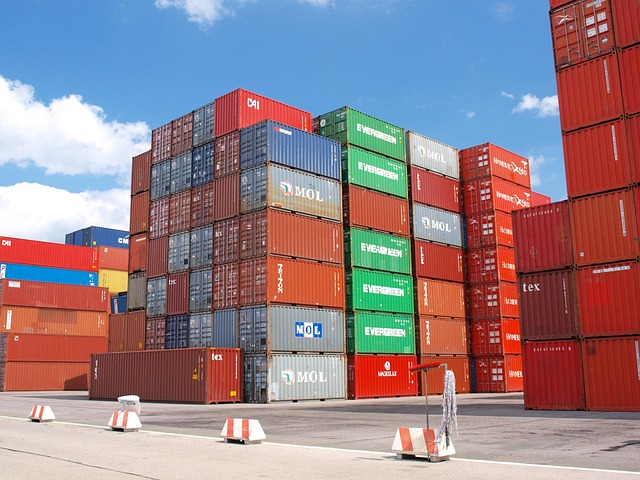The traditional refrigerated storage container market is evolving towards eco-friendly solutions due to environmental concerns related to synthetic refrigerants and energy intensity. This shift focuses on natural refrigerants like ammonia, CO2, and hydrocarbons, coupled with energy-efficient technologies, to minimize the industry's carbon footprint. The refrigerated storage container sector offers customizable portable and modular options in various sizes for food & beverage, pharmaceuticals, and e-commerce industries, catering to different operational scales. These innovative eco-friendly refrigerated storage containers provide cost savings, versatility, and compliance with environmental regulations, revolutionizing cold storage while maintaining product quality. With a booming market, these green containers are gaining traction as sustainable practices become increasingly important in reducing greenhouse gas emissions.
“Discover the future of sustainable refrigeration with eco-friendly refrigerated storage containers. This article explores the growing need for greener solutions, especially in light of traditional refrigerated storage containers’ environmental impact. We delve into the promise of natural refrigerants as a powerful, sustainable alternative.
From understanding the issues to exploring benefits, design aspects, and market trends, this comprehensive guide covers all facets of eco-friendly refrigerated storage containers, revolutionizing the way we think about cold chain logistics.”
- Understanding Traditional Refrigerated Storage Containers and Their Impact
- The Rise of Natural Refrigerants: A Sustainable Solution
- Benefits of Eco-Friendly Refrigerated Storage Containers
- Design Considerations for Efficient Natural Refrigeration Systems
- Market Potential and Future Prospects of Green Refrigerated Containers
Understanding Traditional Refrigerated Storage Containers and Their Impact

Traditional refrigerated storage containers, often known as reefer containers, have been a cornerstone in the logistics and warehousing industry for decades. These containers are designed to maintain optimal temperatures for perishable goods during transport and storage, ensuring freshness and quality. However, the reliance on synthetic refrigerants and energy-intensive systems has raised significant environmental concerns. The impact of these traditional methods extends beyond climate change, with high greenhouse gas emissions contributing to global warming.
Moreover, the constant need for cooling creates a substantial carbon footprint due to the excessive energy consumption. This has prompted a shift towards more sustainable alternatives, leading to the innovation of eco-friendly refrigerated storage containers. By embracing natural refrigerants and energy-efficient technologies, these modern solutions offer a greener approach to temperature-controlled storage, catering to various industries’ needs while minimizing environmental degradation.
The Rise of Natural Refrigerants: A Sustainable Solution

The world is witnessing a significant shift towards sustainable practices across various industries, and the refrigerated storage container market is no exception. The traditional reliance on hydrofluorocarbons (HFCs) as refrigerants has been a major environmental concern due to their high global warming potential. This has led to a growing demand for natural refrigerants as an eco-friendly alternative in refrigerated storage containers. These natural options, such as ammonia, carbon dioxide, and hydrocarbon gases, offer a greener approach to temperature control without compromising performance.
By adopting natural refrigerants, manufacturers are creating energy-efficient refrigerated storage containers that reduce the environmental impact of cold storage solutions. This trend is not only beneficial for the planet but also for businesses looking to enhance their sustainability credentials. With various options available, from refrigerated shipping containers to modular refrigerated storage containers, companies can now access a wide range of insulated storage containers designed with the future in mind, ensuring compliance with environmental standards while meeting the demands of modern logistics and warehousing.
Benefits of Eco-Friendly Refrigerated Storage Containers

Eco-friendly refrigerated storage containers offer a sustainable and energy-efficient solution for various industries, including food and beverage, pharmaceuticals, and e-commerce. By utilizing natural refrigerants, these containers significantly reduce their carbon footprint compared to traditional models that rely heavily on fossil fuels. This shift towards sustainability is not only beneficial for the environment but also provides numerous advantages for businesses.
One of the key benefits is cost savings. Natural refrigerants have lower global warming potential (GWP), which means they contribute less to climate change. Additionally, energy-efficient designs in these containers can lead to substantial electricity bills savings over time. They are also versatile and customizable, allowing businesses to find the perfect fit for their specific needs. Whether it’s a temporary solution or a permanent addition to a warehouse, eco-friendly refrigerated storage containers offer a reliable and sustainable choice with options like portable, modular, and custom designs available in various sizes and prices, catering to different scales of operations.
Design Considerations for Efficient Natural Refrigeration Systems

When designing eco-friendly refrigerated storage containers with natural refrigerants, several key considerations come into play to ensure optimal efficiency and sustainability. One primary focus is on insulation—a crucial element in maintaining cold chain integrity while minimizing energy consumption. High-quality, thick insulation materials are essential to create an insulated storage container that retains cold air, reducing the need for excessive refrigeration. Proper sealing and ventilation systems also play a significant role, as they prevent temperature fluctuations and ensure consistent cooling throughout the refrigerated shipping container or refrigerated warehouse container.
Furthermore, selecting suitable natural refrigerants is vital. Unlike traditional synthetic refrigerants, these eco-friendly alternatives have minimal environmental impact but must be chosen based on the specific needs of the refrigerated storage container. The right refrigerant will provide efficient cooling while adhering to stringent environmental regulations. Other design considerations include energy-efficient components, such as compressors and fans, which contribute to overall system performance and help reduce operational costs. Customization options allow for tailored solutions, catering to various product requirements and ensuring every portable refrigerated storage container or modular refrigerated storage container meets the unique needs of different industries.
Market Potential and Future Prospects of Green Refrigerated Containers

The market for eco-friendly and sustainable refrigerated storage containers is experiencing a significant surge, driven by a growing awareness of environmental concerns and stricter regulations on traditional refrigerants. As consumers become more conscious about their carbon footprint, there is a rising demand for green alternatives in various industries, including food and beverage, pharmaceuticals, and e-commerce. The potential for refrigerated storage containers that utilize natural refrigerants is immense, as they offer a more sustainable and cost-effective solution compared to conventional refrigerated units.
With the increasing focus on reducing greenhouse gas emissions, many businesses are now seeking ways to minimize their environmental impact. Refrigerated storage containers, especially those designed with energy efficiency in mind, cater to this need by providing a flexible and mobile cold storage solution. The future prospects for these green refrigerated containers look promising, as manufacturers continue to innovate and introduce advanced technologies, making them more accessible and affordable. This growing trend opens up various opportunities for businesses to adopt sustainable practices while ensuring the integrity of their perishable goods, ultimately contributing to a greener planet.
The shift towards eco-friendly refrigerated storage containers, powered by natural refrigerants, is a significant step in the industry’s evolution. By adopting sustainable practices, we can reduce the environmental impact of refrigeration while reaping numerous benefits, including energy efficiency and lower greenhouse gas emissions. As awareness grows and technology advances, the market potential for green refrigerated containers is set to boom, paving the way for a more environmentally conscious future in storage logistics.
